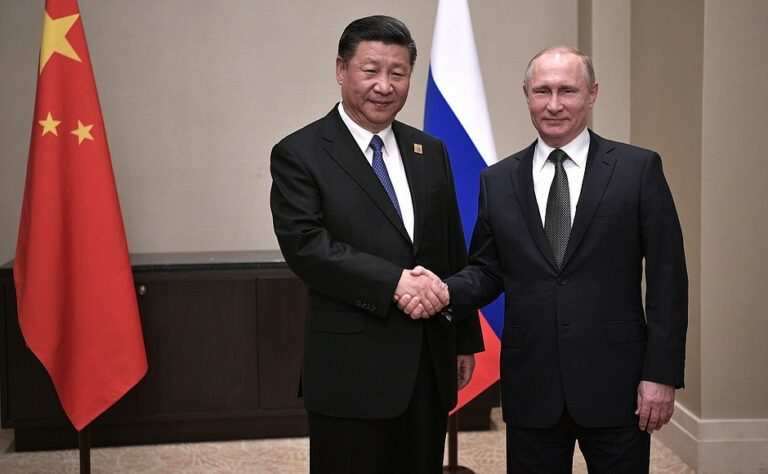
This article was originally published by Radio Free Asia and is reprinted with permission.
Beijing has become “an even more critical economic partner” for Moscow since the invasion of Ukraine, a new report by the U.S. intelligence community says, with China buying more Russian oil and gas than before and helping the country skirt U.S. sanctions.
Released Thursday by the office of Avril Haines, the director of national intelligence, the report says Beijing has pursued “economic support mechanisms for Russia that mitigate both the impact of Western sanctions and export controls” meant to financially strangle Moscow.
“The PRC has increased its importation of Russian energy exports, including oil and gas supplies rerouted from Europe,” it says, calling China “an increasingly important buttress for Russia in its war effort” and saying it is “probably supplying Moscow with key technology.”
“Beijing has also significantly increased the use of its currency, the yuan, and its financial infrastructure in commercial interactions with Russia, allowing Russian entities to conduct financial transactions unfettered of Western interdiction,” the nine-page report says.
It says that China has since the February 2022 invasion of Ukraine become “Russia’s most important trading partner, although as of April 2023 it had not fully replaced Western trade volumes” before the war.
Cheap energy
China has benefitted from the arrangement, the report notes, and it has not necessarily been driven by a desire to support Moscow, despite the two countries’ burgeoning “no-limits” friendship declared last year.
Instead, the buying was “spurred by steep discounts on oil” in the wake of the G-7’s $60 price cap on Russian oil, it says, with the high volume of trade nevertheless “providing Moscow much-needed revenue” to fund its war effort, as Western sanctions squeeze its economy.
Overall Russian imports from China increased 13 percent year-on-year in 2022, the report says, while exports to China increased 43 percent to hit $114 billion, causing total bilateral trade to hit a record high.
In terms of Russian crude oil, the report says China last year overtook India as Moscow’s largest buyer, with Chinese imports peaking at 2 million barrels per day in May 2022, shortly after the war began.
Russia also sold twice as much liquefied gas to China in 2022 compared to 2021, and the two countries had agreed to construct a second Siberian pipeline to support surging natural gas exports.
Microchip exports from China to Russia, meanwhile, increased by 19 percent, the report says. But it notes that China is currently “still unable to make advanced chips that are competitive with U.S. and Western options” when it comes to military purposes, with the chips often failing.
That has led Russia to look elsewhere.
More than a year into the invasion, the report notes, “hundreds of millions of dollars’ worth of U.S.-made or U.S.-branded semiconductors are flowing into Russia despite sanctions and export controls,” even as official global exports of microchips to Russia and Belarus fell 54%.
Liu Pengyu, a spokesperson for the Chinese Embassy in Washington, said trade between China and Russia was legitimate economic activity and said it should be left “free from disruption or coercion.”
“On the Ukraine issue, China upholds an objective and just position, actively promotes talks for peace and has played a constructive part in facilitating a political settlement of the crisis,” Liu told Radio Free Asia.
“China does not sell weapons to parties involved in the Ukraine crisis and prudently handles the export of dual-use items in accordance with laws and regulations,” the spokesperson said. “China-Russia economic and trade cooperation is completely above-board.”
Weapons transfers
The report does not accuse China of supplying Russia with weapons for its war effort, which U.S. officials have said would be a red line.
Politico on Monday published a story detailing apparent sales of military hardware from Chinese firms to Russia, but State Department spokesman Matthew Miller said the report had not been verified and appeared to downplay sales by private companies.
“We would obviously have to conduct our own assessment before making any kind of determination about whether an activity was a sanctions violation or whether we need to impose additional sanctions in response to some activity that we’ve seen,” Miller said.
The United States would “very much oppose any action on the government side – the Chinese Government transferring lethal assistance to Russia,” he said, but still had “concerns” about weapons transfers “on the private sector side” from China to Russia.
0 comments :
Post a Comment